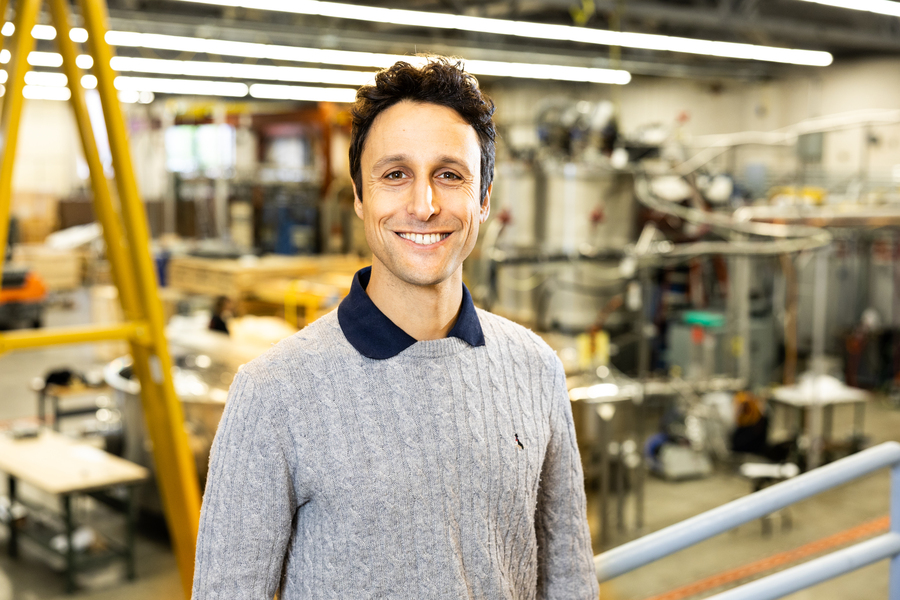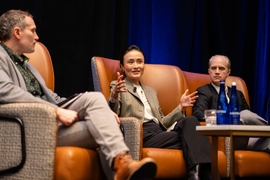MIT Proto Ventures is the Institute’s in-house venture studio — a program designed not to support existing startups, but to create entirely new ones from the ground up. Operating at the intersection of breakthrough research and urgent real-world problems, Proto Ventures proactively builds startups that leverage MIT technologies, talent, and ideas to address high-impact industry challenges.
Each venture-building effort begins with a “channel” — a defined domain such as clean energy, fusion, or AI in health care — where MIT is uniquely positioned to lead, and where there are pressing real-world problems needing solutions. Proto Ventures hires full-time venture builders, deeply technical entrepreneurs who embed in MIT labs, connect with faculty, scout promising inventions, and explore unmet market needs. These venture builders work alongside researchers and aspiring founders from across MIT who are accepted into Proto Ventures’ fellowship program to form new teams, shape business concepts, and drive early-stage validation. Once a venture is ready to spin out, Proto Ventures connects it with MIT’s broader innovation ecosystem, including incubation programs, accelerators, and technology licensing.
David Cohen-Tanugi SM '12, PhD '15 has been the venture builder for the fusion and clean energy channel since 2023.
Q: What are the challenges of launching startups out of MIT labs? In other words, why does MIT need a venture studio?
A: MIT regularly takes on the world’s “holy grail” challenges, such as decarbonizing heavy industry, preventing future pandemics, or adapting to climate extremes. Yet despite its extraordinary depth in research, too few of MIT’s technical breakthroughs evolve into successful startups targeting these problems. Not enough technical breakthroughs in MIT labs are turning into commercial efforts to address these highest-impact problems.
There are a few reasons for this. Right now, it takes a great deal of serendipity for a technology or idea in the lab to evolve into a startup project within the Institute’s ecosystem. Great startups don’t just emerge from great technology alone — they emerge from combinations of great technology, unmet market needs, and committed people.
A second reason is that many MIT researchers don’t have the time, professional incentives, or skill set to commercialize a technology. They often lack someone that they can partner with, someone who is technical enough to understand the technology but who also has experience bringing technologies to market.
Finally, while MIT excels at supporting entrepreneurial teams that are already in motion — thanks to world-class accelerators, mentorship services, and research funding programs — what’s missing is actually further upstream: a way to deliberately uncover and develop venture opportunities that haven’t even taken shape yet.
MIT needs a venture studio because we need a new, proactive model for research translation — one that breaks down silos and that bridges deep technical talent with validated market needs.
Q: How do you add value for MIT researchers?
A: As a venture builder, I act as a translational partner for researchers — someone who can take the lead on exploring commercial pathways in partnership with the lab. Proto Ventures fills the gap for faculty and researchers who believe their work could have real-world applications but don’t have the time, entrepreneurial expertise, or interested graduate students to pursue them. Proto Ventures fills that gap.
Having done my PhD studies at MIT a decade ago, I’ve seen firsthand how many researchers are interested in impact beyond academia but don’t know where to start. I help them think strategically about how their work fits into the real market, I break down tactical blockers such as intellectual property conversations or finding a first commercial partner, and I roll up my sleeves to do customer discovery, identify potential co-founders, or locate new funding opportunities. Even when the outcome isn’t a startup, the process often reveals new collaborators, use cases, or research directions. We’re not just scouting for IP — we’re building a deeper culture of tech translation at MIT, one lab at a time.
Q: What counts as a success?
A: We’ve launched five startups across two channels so far, including one that will provide energy-efficient propulsion systems for satellites and another that is developing advanced power supply units for data centers.
But counting startups is not the only way to measure impact. While embedded at the MIT Plasma Science and Fusion Center, I have engaged with 75 researchers in translational activities — many for the first time. For example, I’ve helped research scientist Dongkeun Park craft funding proposals for next-generation MRI and aircraft engines enabled by high-temperature superconducting magnets. Working with Mike Nour from the MIT Sloan Executive MBA program, we’ve also developed an innovative licensing strategy for Professor Michael P. Short and his antifouling coating technology. Sometimes it takes an outsider like me to connect researchers across departments, suggest a new collaboration, or unearth an overlooked idea. Perhaps most importantly, we’ve validated that this model works: embedding entrepreneurial scientists in labs changes how research is translated.
We’ve also seen that researchers are eager to translate their work — they just need a structure and a partner to help them do it. That’s especially true in the hard tech in which MIT excels. That’s what Proto Ventures offers. And based on our early results, we believe this model could be transformative not just for MIT, but for research institutions everywhere.










